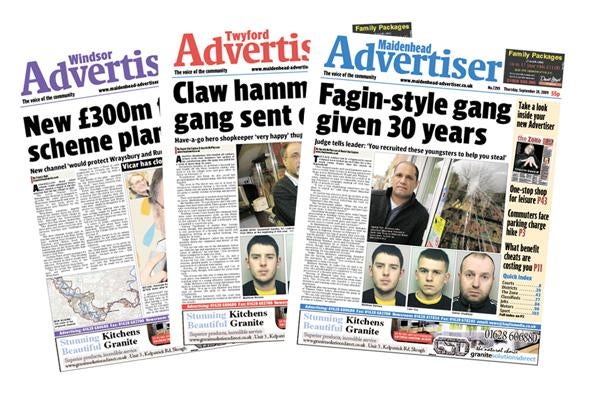
The editor of the charitable trust-owned Maidenhead Advertiser fears falling ad revenues are undermining investigative journalism in the local press.
The weekly Maidenhead Advertiser is wholly owned by the Louis Baylis Charitable Trust, which was set up in 1962 by then editor and proprietor Louis Baylis to safeguard the independence of the paper, with around 75 to 80 per cent of profits donated to good causes in the community.
Since the recession, however, the paper has been giving ‘less and less’to local causes due a slump in revenue, and editor Martin Trepte believes the paper is unlikely to return to pre-recession profit levels following the loss of public sector advertising.
‘If the economy picks up we will not be going back to those levels of revenue that we got 10 years ago,’he told a Lords committee on the future of investigative journalism.
The result is that local titles now have less time and resources to spend on investigations and long-term projects, he said.
‘When you talk about investigative journalism some people think of dressing up as sheikhs, staking people out and things like that,’he said.
‘We do not do that. We are talking about things that are relevant to and are important to a local community.”
Trepte said there was an ‘element of investigation in everything”, adding: ‘Every hard news story has an element of investigation.
‘I think that what we do would be better described as ‘holding to account’ journalism. With our background with the Trust we also have quite a strong public service ethos. That is the context in which we produce our newspapers.”
Trepte said that being an independent meant he could keep editorial resources up to a ‘reasonable standard”.
But he added: ‘Even so, we have absolutely no slack in our system; we are going flat out to produce our newspapers on a weekly basis.
‘If there are threats, it is a time and resource issue, in terms of spending time on more complicated stories.
‘As you have heard, they can take 10 years. I do not have an example of one that we have worked on for 10 years, but we have stories on which we have worked for several weeks before they see the light of day.
‘There are other stories where you have to sift out the hearsay from the hard facts.
‘You look at something and think, ‘we can invest a lot of time trying to stand this up’, or we will look into things and think, ‘there’s no way we can stand this up without risk of defamation’, and it will not be worth the effort, time and resources that we put into it.”
Trepte said the other big issue he found as an editor was the ‘rise of the press officer and the media manager’whose role is to ‘manage, rather than assist, the press”, claiming there was now a tendency for organisations to ‘try to hide behind a wall of officialdom”.
‘The journalist’s job is to find a way through that wall and obviously that takes time, patience and perseverance,’he told the committee.
‘If your resources are being cut and you do not have time to spend on it you might take the first official response that is given to you rather than probe any further.”
Asked for her thoughts on the future of the local press, Dame Liz Forgan, chair of the Scott Trust which runs the Guardian Media Group, told the same committee: “The demise of local print media has happened already; it is finished and done.
‘It went like snow in summer. The question is whether it can be resurrected in a different form. I am absolutely sure it can.
‘The digital future is one of enormous optimism. All kinds of things can happen. The tricky part is to work out the business model that will sustain it.
‘Whether it is a straightforward money in, money out, operation, or whether it is some kind of backing or subsidy from somebody, we must all figure out, but the possibilities are enormous.”
Guardian Media Group has sold or closed all its regional press operations over recent years. In April this year GMG closed its local news websites for Cardiff, Edinburgh and Leeds with the loss of four jobs
Email pged@pressgazette.co.uk to point out mistakes, provide story tips or send in a letter for publication on our "Letters Page" blog






